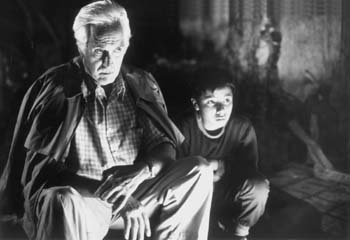Jungle Warfare
Jungle Fever: Federico Luppi and Dan Rivera Gonzáles learn some hard truths in the Central American highlands in 'Men With Guns.'
In 'Men With Guns' deaths are painfully matter-of-fact
IT'S A TRIBUTE to novelist, filmmaker and actor John Sayles' intelligence that his new movie, Men With Guns, doesn't seem like a stunt for having been written in Spanish and shown with subtitles. Sayles' canny, mordant film concerns a newly widowed doctor in an unnamed small country in Latin America. Dr. Fuentes (Federico Luppi, the Fernando Rey-like actor who starred in the Mexican horror film Cronos) is on a trip to visit the students he trained to be barefoot doctors in the highlands. Oblivious as only a really good person can be, Fuentes heads deep into the countryside only to learn that his pupils have been "disappeared" by soldiers fighting a "dirty war" he hadn't known anything about. Fuentes' guides are a reject kid (played by a bright 13-year-old newcomer named Dan Rivera Gonzáles) and Domingo (Damián Delgado), a wounded, angry army deserter turned robber.
In the past, Sayles was a writer first and a director afterward; his focus was on speech and characters. Lately, he has been working harder on the imagery and the music in his films. The jungle grows greener, lusher and thicker as Fuentes gets lost; seeing this dense, dark bush, you understand why jungle movies are so full of aerial photography. The soundtrack by Mason Daring (with consultation by the outstanding world-music DJ Tom Schnabel, formerly with the KPFA radio show Morning Becomes Eclectic) mirrors the journey from the city to the jungles. (Daring also drops in an ironic bit of Yma Sumac for a night at a tourist resort with colored floodlights and a few fake pagan temples.)
Men With Guns isn't about a massacre but about the aftermath of violence. As in Sayles' last movie, Lone Star, the subject is the pile of bones left behind after the attackers have fled for the tall timber. Every act of violence we see is in flashback, usually told by a witness. Violence doesn't clear the air; it clouds it, making it more difficult to see the past. It's significant that the only "witness" to one massacre Fuentes finds out about is a blind woman. While Sayles doesn't argue the injustice, he doesn't argue the superior virtue of the murdered either; he doesn't bring distance to the story by making the murdered natives angels whose culture is superior to the men with guns who attack them.
Sayles' study of the killings in Central America--and elsewhere, hence the generic title--shows the complex situations that result in simple murder. There is less magical realism in Men With Guns than there has been in any recent movie by a North American gone south. Sayles' decision to make the killings ordinary, matter-of-fact and free of symbolism isn't cold-blooded but coldly intelligent. The only way to understand what indigenous people endure as they are rounded up, raped or shot is to remember that they are as ordinary a bunch as you and your neighbors.
[ San Jose | Metroactive Central | Archives ]
![]()

Joyce Rudolph
Men With Guns (R; 126 min.), directed and written by John Sayles, photographed by Slavomir Idziak and starring Federico Luppi, opens Thursday at the Nickelodeon.
From the March 12-18, 1998 issue of Metro.
![[Metroactive Movies]](/movies/gifs/movies468.gif)